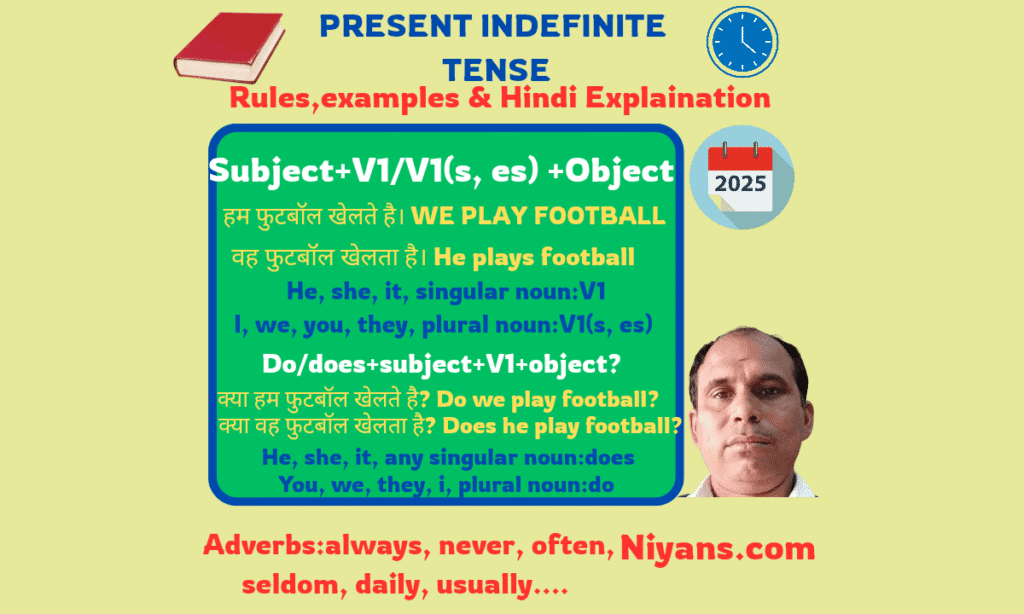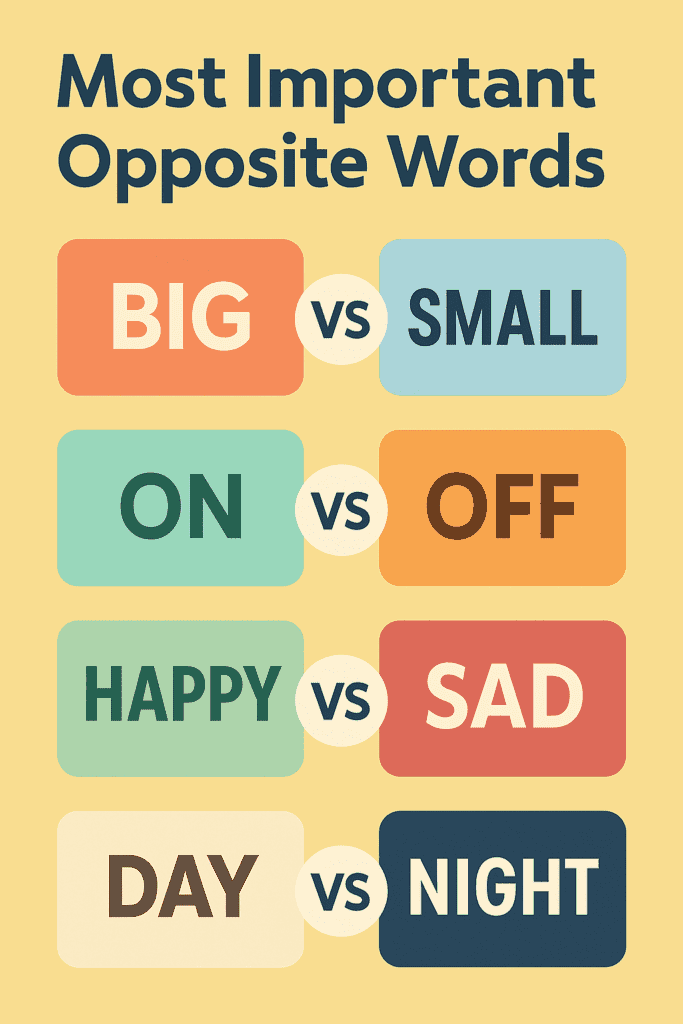Past Perfect Continuous Tense
यह काल उस क्रिया (कार्य) को दर्शाता है जो भूतकाल में किसी बिंदु से पहले शुरू हुई थी और किसी अन्य भूतकालीन घटना या समय बिंदु तक लगातार जारी रही थी।जैसे
- वह दो घंटे से खाना बना रही थी जब मेहमान आए।
भूतकाल में पहले शुरू हुई घटना
- वह दो घंटे से खाना बना रही थी
दूसरी भूतकालीन घटना:
- जब मेहमान आए।
इस वाक्य से पता चलता है कि
- क्रिया (पढ़ना) भूतकाल में शुरू हुई थी
और दो घंटे तक जारी रही थी
- यह कार्य जब मेहमान आए तब तक चलता रहा
तो इस प्रकार के कार्यो के लिय हम Past Perfect Continuous Tense प्रयोग करेंगें।
Helping Verb of Past Perfect Continuous Tense
Past Perfect Continuous Tense में “had been” को सहायक क्रिया (helping verb) के रूप में प्रयोग किया जाता है।
Subject | Helping Verb |
I, You, He, She, It, We, They, कोई भी singular/plural subject | had been |
यह सभी subjects के साथ एक ही रहता है — “had been” (कोई बदलाव नहीं होता है)
Note:
- had → बताता है कि काम भूतकाल में पहले शुरू हुआ था।
- been → यह दर्शाता है कि क्रिया लगातार चल रही थी।
Verb in Past Perfect Continuous Tense
इस tense में Verb की “-ing” form (Present Participle) का प्रयोग होता है।
Base Verb | Verb-ing Form | Sentence | Hindi Meaning |
read | reading | She had been reading. | वह पढ़ रही थी। |
write | writing | He had been writing a letter. | वह पत्र लिख रहा था। |
work | working | I had been working since morning. | मैं सुबह से काम कर रहा था। |
go | going | They had been going to school. | वे स्कूल जा रहे थे। |
play | playing | We had been playing cricket. | हम क्रिकेट खेल रहे थे। |
Past Perfect Continuous Tense में प्रयुक्त होने वाले Key Words / Time Adverbs:
Past Perfect Continuous Tense का प्रयोग अक्सर समय की अवधि बताने वाले शब्दों के साथ किया जाता है। ये शब्द हमें यह बताते हैं कि क्रिया कब से चल रही थी या कितनी देर तक चली थी।
Time Adverb / Keyword | हिंदी अर्थ | उदाहरण वाक्य (English) | हिंदी अनुवाद |
for + अवधि | … तक (समय अवधि) | She had been reading for two hours. | वह दो घंटे से पढ़ रही थी। |
since + समय बिंदु | … से (शुरुआत बिंदु) | He had been living here since 2010. | वह 2010 से यहाँ रह रहा था। |
all day / all night | पूरे दिन / रात | I had been working all day. | मैं पूरे दिन काम कर रहा था। |
before | पहले | He had been crying before I came. | मेरे आने से पहले वह रो रहा था। |
until | जब तक | They had been waiting until the gates opened. | वे जब तक गेट खुले, इंतजार कर रहे थे। |
by the time | जब तक | By the time she arrived, we had been waiting for an hour. | जब तक वह आई, हम एक घंटे से इंतजार कर रहे थे। |
recently | हाल ही में | He had been working hard recently. | वह हाल ही में कड़ी मेहनत कर रहा था। |
lately | हाल में | She had been feeling tired lately. | वह हाल में थका हुआ महसूस कर रही थी। |
Note:
- For + अवधि (time duration): for two hours, for five days, for a year
- Since + शुरू होने का समय: since morning, since 5 o’clock, since 2015
Since and for की अधिक जानकारी के लिए हमारा ब्लॉग Present Perfect Continuous जरूर पढ़ें
Structure (रचना):
Affirmative Sentences in Past Perfect Continuous Tense
Subject + had been + Verb (ing form) + Object + Time (optional)
“Subject + had been + verb-ing + time duration + before/when + another past action”
- I had been reading for an hour before the lights went out.
मैं एक घंटे से पढ़ रहा था जब बिजली चली गई। - She had been cooking for two hours when the guests arrived.
वह दो घंटे से खाना बना रही थी जब मेहमान आए। - They had been playing cricket since morning before it started raining.
वे सुबह से क्रिकेट खेल रहे थे जब बारिश शुरू हुई। - He had been working all day before he finally took rest.
वह पूरे दिन से काम कर रहा था जब उसने आखिरकार आराम किया। - We had been waiting for the train for half an hour when it finally came.
हम आधे घंटे से ट्रेन का इंतज़ार कर रहे थे जब वह आखिरकार आई। - The teacher had been teaching for 45 minutes before the bell rang.
शिक्षक 45 मिनट से पढ़ा रहे थे जब घंटी बजी। - You had been living in that house for ten years before you sold it.
तुम उस घर में दस साल से रह रहे थे जब तुमने उसे बेचा। - Rahul had been learning guitar for months before he performed on stage.
राहुल महीनों से गिटार सीख रहा था जब उसने मंच पर प्रदर्शन किया। - The child had been crying for an hour before his mother arrived.
बच्चा एक घंटे से रो रहा था जब उसकी माँ आई। - She had been trying to call you before you messaged her.
वह तुम्हें कॉल करने की कोशिश कर रही थी जब तुमने उसे मैसेज किया।
Negative Sentences (Structure):
Subject + had not been + verb-ing + time expression + (before/when clause)
- I had not been studying for two hours before the test started.
मैं दो घंटे से नहीं पढ़ रहा था जब परीक्षा शुरू हुई। - She had not been cooking since morning when her guests arrived.
वह सुबह से खाना नहीं बना रही थी जब उसके मेहमान आए। - They had not been working regularly before the manager came.
वे प्रबंधक के आने से पहले नियमित रूप से काम नहीं कर रहे थे। - We had not been waiting long when the bus finally arrived.
हम ज़्यादा देर से इंतज़ार नहीं कर रहे थे जब बस आई। - He had not been feeling well before he visited the doctor.
वह डॉक्टर के पास जाने से पहले ठीक महसूस नहीं कर रहा था।
Interrogative Sentences in the Past Perfect Continuous Tense, including:
- Yes/No Type Questions
- Wh-word Type Questions
With Hindi translations for better understanding.
Structure 1: Yes/No Questions
Had + subject + been + verb-ing + time?
Examples:
- Had you been studying for two hours?
क्या तुम दो घंटे से पढ़ रहे थे? - Had she been cooking since morning?
क्या वह सुबह से खाना बना रही थी? - Had they been working on the project before the deadline?
क्या वे समय सीमा से पहले परियोजना पर काम कर रहे थे?
Structure 2: Wh-word Questions
Wh-word + had + subject + been + verb-ing + time?
Examples:
- Why had he been crying before the teacher came?
वह शिक्षक के आने से पहले क्यों रो रहा था? - How long had you been waiting for the bus?
तुम कितनी देर से बस का इंतजार कर रहे थे? - Where had they been living before they moved here?
वे यहाँ आने से पहले कहाँ रह रहे थे? - What had she been doing since morning?
वह सुबह से क्या कर रही थी?
Negative-Interrogative Sentences in Past Perfect Continuous Tense
1. Yes/No Type (Helping verb first)
Structure:
Had + subject + not + been + verb-ing + time?
(Short form: Hadn’t)
Examples:
- Had you not been studying for two hours?
क्या तुम दो घंटे से नहीं पढ़ रहे थे? - Hadn’t she been working in that company since 2010?
क्या वह 2010 से उस कंपनी में काम नहीं कर रही थी? - Had they not been playing cricket before it rained?
क्या वे बारिश से पहले क्रिकेट नहीं खेल रहे थे?
2. Wh-word Type (Wh-word first)
Structure:
Wh-word + had + subject + not + been + verb-ing + time?
Examples:
- Why had you not been attending classes regularly?
तुम नियमित रूप से कक्षा में क्यों नहीं आ रहे थे? - Where had she not been going since last week?
वह पिछले सप्ताह से कहाँ नहीं जा रही थी? - What had he not been doing that caused the problem?
वह क्या नहीं कर रहा था जिससे समस्या हुई?
Subject + had been + verb-ing + time expression + before/when + another past action
Practice Worksheet:
Each sentence contains two parts:
(1) Past perfect continuous action
(2) A simple past event (before/when…)
Fill in the blanks:
- He __________ (write) notes for hours before he closed the book.
- They __________ (argue) since morning before the teacher entered.
- She __________ (wait) for him for two hours when he arrived.
- We __________ (repair) the car all afternoon before the rain started.
- I __________ (study) hard before I finally took a break.
- You __________ (run) for thirty minutes before the bell rang.
- The workers __________ (work) on the site before the storm hit.
- Ramesh __________ (watch) TV for hours when the lights went out.
- The child __________ (cry) continuously before his mother hugged him.
- They __________ (practice) for weeks before the match began.
Answer Key:
- had been writing
- had been arguing
- had been waiting
- had been repairing
- had been studying
- had been running
- had been working
- had been watching
- had been crying
- had been practicing
निष्कर्ष: Past Perfect Continuous Tense (भूतकालीन पूर्ण सतत काल)
यह काल दर्शाता है कि—
कोई कार्य भूतकाल में किसी निश्चित समय से चल रहा था
और वह कार्य दूसरे भूतकालीन कार्य से पहले तक जारी रहा
मुख्य बातें (Key Points):
Helping Verb: had been (सभी subjects के साथ यही लगता है)
Main Verb: क्रिया का -ing रूप
Time expressions: for, since, all day, before, when आदि
इस काल का उपयोग दो भूतकालीन घटनाओं को जोड़ने के लिए किया जाता है:
एक जो लगातार चल रही थी
दूसरी जो उसके बाद पूरी हुई
Also Read:Past Continuous Tense explained in Hindi


